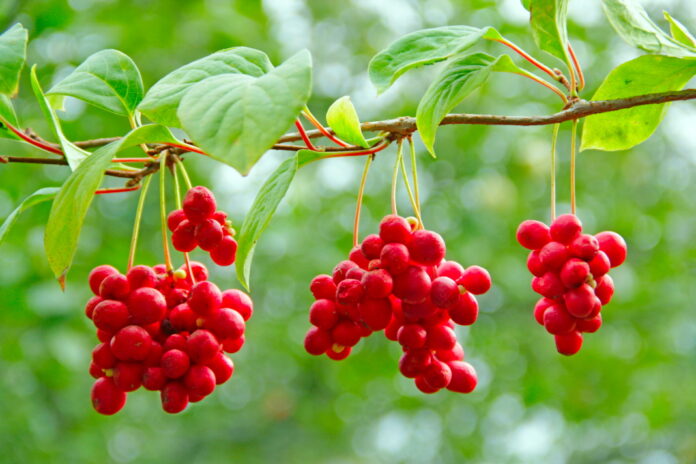
By Dae Sun Hong, L.Ac.
Schisandra, also called ‘magnolia Berry’ and ‘Five Flavor Fruit,’ have indications for helping cognitive function improvement, insomnia, and sexual ability. And it also suppresses chronic coughing, lowers glucose levels, and acts as an anti-inflammatory and anticancer agent. Schisandra could work best with other Asian herbal medicine.
Why Western Herbs?
I have introduced western herbs to the acupuncturist for 25 years. The western herbal market has grown rapidly. Back then, the market only sold local herbs. But the market has been more diverse with herbs from South America, Asia, and Ayurvedic herbs. Now the market is more international than ever.
As more people use the herb, the number of herbal studies has increased by Western medicinal sectors in Europe and America. Due to the scientific bases, even Western medicine has used herbs more than ever. More scientific data regarding applying herbs makes more Western doctors feel comfortable recommending herbs to their patients.
It makes me happy that Western medicine has researched and recommended more herbs, but it does not completely make me happy because it seems that acupuncturists are losing their leadership in researching and recommending herbs for patients.
One of the important modalities of the acupuncturist, administrating of herbs should be led by the acupuncturists. It also matches our treatment principle in which local herbs have a better chance to help the local people. To utilize the local herbs for America effectively, we should approach the Western herbs from a different point of view from Asian medicinal understandings. For acupuncturists, Asian medicinal theories are important, but we are dealing with the American people and do not overlook the regional factors of the patients. Asian medicine has a long history, but it has been developed by treating Asian people. As we are treating in America, regional factors cannot be overlooked. And it makes us study more than acupuncturists in Korea or China.
Schisandra, Adaptogenic Herb
Most acupuncturists are already familiar with Schisandra, also called five flavor fruits, and used to care for coughing. The herb is also used in America as a supplement. Schisandra is an adaptogenic herb that controls the stress response, helps maintain healthy homeostasis, and boosts immune function. Most importantly, it does not harm the human body for taking. One of the benefits of using an Adaptogenic herb is that a single herb could provide full benefits because it contains complex chemicals. It works as an herbal formula from Asian medicine.
Benefits
Traditionally, Schisandra has been used for suppressing coughing, helping liver and stomach function and spontaneous sweating, and boosting overall vitality.
Schisandra has five tastes: bitter, sweet, salty, sour, and pungent. All five taste has its treatment effect respectively but sour taste has the most distinctive. In Asia, Schisandra is called a five-flavored fruit.
Memorial Sloan Kettering Cancer Center is well known for providing acupuncture treatment for their patients introduced the Schisandra has anti-inflammatory, anticancer, and cardioprotective effects. Also, it protects the liver, and nerve system, enhancing mind and body function.
The followings are summarized benefits of Schisandra:
① Improving the cognitive function: with turmeric, Schisandra is used to treat Mild Cognitive Impairment, MCI.
② Chronic coughing or asthma: If the symptom originated from the weakness of lung function, Schisandra could treat the symptoms. And excessive sweating due to weakness, night sweating, and constant diarrhea without cause could be treated with Schisandra.
③ Lowering glucose level: Cinnamon helps Schisandra’s glucose control effect.
④ Aftereffects of serious illnesses such as fatigue, low energy, stress, and insomnia.
⑤ Calming the stress and enhancing sexual ability.
How to use:
Schisandra is generally used in dry form to make teas. But if Schisandra is used to treat chronic coughing, use honey mixed Schisandra tea. To make the tea, mix Schisandra with honey and let the mixture stays for at least a week in a dark place. Mixing with honey is one of the Asian medicinal techniques to reduce an herb’s possible side effects. Schisandra tea with ginger or cinnamon is recommended for anyone who easily feels cold and has high glucose levels. Cinnamon brings a synergy effect when it is mixed with Schisandra. And Korean ginseng could be mixed for chronic fatigue.
There are many forms of Schisandra in the market, such as powder, capsule, and dried Schisandra forms.
Keep this in mind
Schisandra is generally considered safe with a few side effects, but in some cases, it causes symptoms like indigestion or decreasing appetites. It should be used less than 5 to 10 grams per day to prevent advert reaction.
Schisandra could make worse a symptom related to Gastroesophageal reflux disease: GERD. To avoid side effects, it should be used in small amounts of honey mixed with Schisandra tea.
Otherwise, Schisandra, an Adaptogenic herb with restorative and treating benefits, should be recommended for the middle-aged population.





































